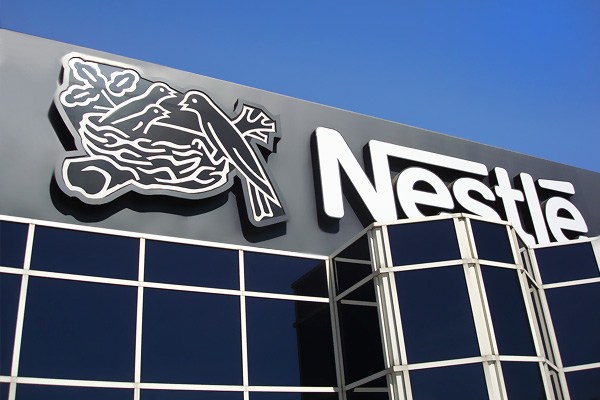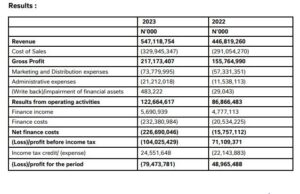By
Vivian Ihechu
The devaluation of the Nigeria naira has had significant effects on various aspects of the economy especially on businesses/manufacturing industries, impacting volume of imports, financial performance, and development of indigenous entrepreneurial businesses. Among other impacts, it led to inflation, making it difficult for businesses to operate and for consumers to afford essential goods.
Devaluation is the reduction in the value of the money of one country when it is exchanged for the money of another country.
According to a Feb.1, 2024 Financial Times Report, Nigeria devalued its currency twice in eight months.
However, the move had yet to produce the projected outcomes, as the country’s muddled system of exchange rates and foreign investment in an ailing economy remain shaky.
The Nigerian Economic Summit Group (NESG) said the unification of exchange rates took a toll on many foreign-owned businesses in Nigeria especially foreign-owned subsidiaries, including Nestle among others, which have lost over N900 billion to currency devaluation.
It said that the “Food & Beverage sector’s growth nosedived from 3.9 per cent and 4.3 percent in 2023Q1 and 2023Q2, respectively, to 0.9 per cent in 2023Q3’’.
For, Nestlé Nigeria PLC, a leading food and beverage company in Africa, its Full Year 2023 Financial Results showed that the devaluation of the Naira had an adverse impact on its profit after tax (PAT) resulting in a loss of N79.5 billion for 2023.
Nevertheless, it was not all grim, as revenue increased by over N100 billion, reaching N547 billion versus 2022, while operating profit jumped by 41.2 per cent, reaching 122.7 billion.
In comparison, in its 2022 financial results, Nestlé Nigeria Plc announced a 27.0 per cent revenue growth when compared to her performance in 2021.
Also, in 2022, it posted a revenue of N 446.8 billion as against N 351.8 in the preceding year.
Figure 1: Nestle Nigeria PLC 2023 Financial results
In spite the challenging economic environment, the company was able to record strong revenue growth and profit in 2023.
In the 2023 financial result, Nestlé Nigeria PLC’s sales increased by 22.4 per cent over the previous year, with earnings of N547.1 billion, an increase of N100.2 billion over 2022.
Gross profit was N217.2 billion, representing a 39.4 per cent increase from N155.8 billion in 2022.
Operating profit increased by 41.2 per cent to N 122.7 billion, an increase of N 35.8 billion over 2022.
Commenting on the results, Mr Wassim Elhusseini, Managing Director and CEO of Nestlé Nigeria PLC, “The devaluation of the Nigerian Naira in 2023 which led to a revaluation of our foreign currency obligations undoubtedly impacted our financing cost and consequently the profit after tax.
“However, we remain optimistic of our capacity to overcome the current economic difficulties and emerge stronger.
“I thank every member of our team for the unwavering commitment and dedication which resulted in the strong revenue growth and operating profit vs 2022 despite the challenging economic environment.
“Looking ahead, we remain dedicated to our purpose of unlocking the power of food through responsible local sourcing and confection of the high-quality nutritious food and beverages that families across Nigeria prefer.
“We also remain steadfast in optimizing our operations to ensure the availability and accessibility of affordable and nutritious products to our consumers in anticipation of a timely turnaround in the business environment,’’ Elhusseini said in a statement by Victoria Uwadoka, Corporate Communications, Public Affairs and Sustainability Lead, Nestlé Nigeria.
Mr Gbenga Oyebode, Chairman, Board of Directors, Nestlé Nigeria PLC., noted that the macro-economic headwinds in 2023 were unprecedented with the impact of cash scarcity in Q1 due to the Naira redesign, the devaluation of Naira and removal of fuel subsidy in Q2.
“We witnessed changes in consumer preferences, market dynamics, fiscal and monetary policies as well as the regulatory landscape.
“The year thus presented us an opportunity to demonstrate our resilience as a market leader by remaining true to our core values and adapting our strategies to ensure sustainable growth as the environment became increasingly challenging.’’
In spite the challenge, he noted that in 2023, the company “successfully introduced innovative products that cater to the evolving needs of our consumers.
“We launched NIDO Milk & Soya, and this marked the return of ® the NIDO brand to the Nigeria market.
“We also entered a ® brand-new product category with the introduction of MAGGI Soya Chunks.
“These products not only provide ® more variety for our loyal consumers, but also help us deliver on our brand promise of nourishing individuals and families every day.’’
Oyebode, at the 55th Annual General Meeting (AGM) of the company, held in Lagos, was optimistic that the company’s business operation would even further improve in 2024.
According to him, the company will strategically focus on fostering innovation to deliver affordable nutrition to its loyal customers as it progresses through the year 2024.
He said that Nestle would also commit to achieving operational excellence and nurturing strong relationships with its valued customers and stakeholders.
“We will, therefore, sustain investments in our operations, enhance the capacity of our teams and implement initiatives that address social and environmental problems, promote nutrition, and support local communities to create shared value,” he said.
Oyebode appreciated the shareholders and employees of the company for their unwavering support for the firm.
He lauded the company’s management team for showing leadership and taking timely and effective measures in response to the unstable market realities.
Also, Chief Timothy Adeshiyan, Patron, Nigeria Shareholders Solidarity Association, observed that the company’s bottom line was affected by the country’s economic downturn in the year 2023.
However, he lauded Nestle Nigeria for its overall performance, also being positive that performance would be better in coming years.
Charting a way forward, Nestle Nigeria stakeholders urged the company to intensify efforts toward ensuring raw materials for production were locally sourced, while increasing exports.
These, they said, would address some of the Foreign Exchange issues.
They also noted at the AGM, that the company’s 45 per cent domestic sourcing, against its 55 per cent foreign, was still going to impact on the forex issues.
Already, beyond delivering tasty and nutritious products, the company, through its Creating Shared Value (CSV) principle, partners stakeholders to build strong communities and supply chains, while also improving livelihoods in communities directly connected to their business activities.
For instance, Nestle Nigeria continues to locally source grain sorghum, as a malt ingredient, to tailor their products to match the preferred taste profile of Nigerians in the country and also benefit local farmers.
“In the area of grains, we have successfully developed local farmers and processors … this has been achieved through (a lot of) training in good agricultural practices, harvesting, warehousing and cleaning practices.
“We are now taking this next step to introduce these farmers to regenerative agriculture as part of our sustainability journey and commitment.”
While Nestle Nigeria remains optimistic of being capable of overcoming the current economic difficulties and emerging stronger, the company continues to uphold its quality, excellence, and commitment to creating shared value.
With a heritage of more than 63 years in Nigeria, and a portfolio of iconic household brands, the firm continues to ensure the availability and accessibility of nutritious food and beverages, while supporting communities and safeguarding the environment through sustainable business practices.
Also, it drives initiatives aimed at improving livelihoods: capacity building and access to grants to empower women to achieve business growth, technical training programs to improve youth employability, and the promotion of good agricultural practices among farmers to increase crop productivity and long-term income growth.
Nestle Nigeria boasts of a workforce of over 2,300 direct employees, three manufacturing sites, seven branch offices, and head office located in Lagos.
It produces and markets Nestlé’s brands throughout Nigeria, including MAGGI®, MILO®, GOLDEN MORN®, NIDO®, NESCAFÉ®, Nestlé PURE LIFE®, NAN®, SMA®, LACTOGEN® and CERELAC®.


